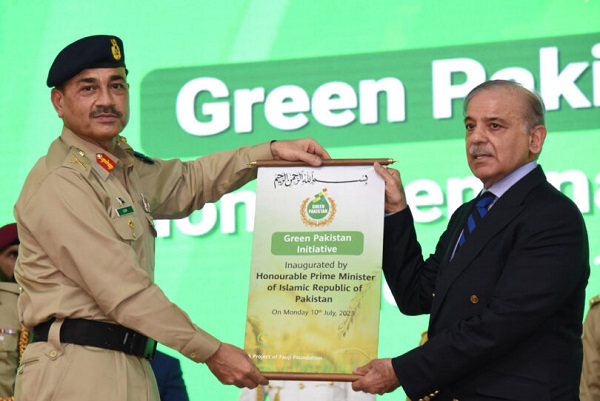Prime Minister Shehbaz Sharif said that the Green Pakistan Initiative would eventually bring about the second agriculture revolution, in addition to the creation of four million jobs in the country. While addressing a seminar on agriculture and food security, he said agriculture was the backbone of the country and the farmers work hard to provide food to millions of people but they are facing a lack of resources. According to him, farmers had the right to avail incentives for the agriculture sector and it was the responsibility of the government to provide them all possible assistance for overall development and progress. Shehbaz vowed that the agricultural sector growth would bring Pakistan to par with developed nations. Meanwhile, the Premier praised the Army Chief’s vision for the development of the agriculture sector that would be implemented through collaboration among federal and provincial governments, agriculture departments, and research institutions in the country.
Over the past decades, Pakistan’s agriculture sector experienced a sharp decline because of no use of the latest technologies, nonavailability or poor quality of fertilizers, deterioration of soil fertility, a lack of modern machinery, equipment, and warehouses, above all high production cost and insufficient reward for farmers’ hard work are the important factors which gradually discouraged growers and led to a collapse in the agriculture sector. Meanwhile, the gap between Argi-production and demand for staples had increased many folds due to conventional methods of farming and a sharp increase in population in the country. According to an estimate, Pakistan needs to increase its food production at least by 40% by 2025 in order to meet its long-term food demands of the 33% predicted increase in population. Currently, Pakistan’s agriculture sector has serious challenges in meeting domestic food requirements due to rapid population growth, low crop production, disastrous climate change effects, and high production cost, which turned a food-sufficient nation into a major grain importer. As of today, a significant boost in agricultural output is essential to secure the agricultural industry in Pakistan. The agricultural sector should utilize the most advanced technologies for soil testing, seed treatment, irrigation and cultivation, crops transportation, and storage, along with the use of modern agricultural practices including crops financing through banks and incentivization/support by the government to help facilitate the growers to put their full efforts to produce high yield crops from their land.
The incumbent government has chalked out a Green Pakistan Initiative aimed at combating climate change effects, desertification, and reverse deforestation to protect the environment, wildlife, and bio-divinity, overcome water scarcity, prevent soil erosion, and promote agriculture and forestry in climate-hit Pakistan. The coalition government has allocated huge funds for this initiative under the budget 2023-2024. The government of Pakistan has also invited Gulf nations to invest in Pakistan Argi-sector which has huge untapped potential and offers lucrative investment opportunities to foreign investors. Currently, Pakistan Army in collaboration with the Punjab government is working on several projects to bring millions of acres of barren and uncultivable land under crops and livestock production, while the Pakistan military owes a pivotal role in the realization of the Green Pakistan Initiative in the days to come.
Historically, Pakistan’s Agri-sector collapsed due to discriminate policies and negligence of the past governments, who fail to prioritize farming vis-a-vis other sectors including industry, real estate, housing, science, and technology thus fast growing housing societies and industrial complexes engulfed thousands of acres of cultivated Greenland, while salinity and soil erosion damaged a vast part of farming-land in Sindh and Punjab. The successive government offered incentives to a few particular crops including sugar, cotton, wheat, and yarn while staples growers often failed to receive their production cost which shattered their belief in their profession, increased dependence on imported foodstuffs, and caused inflation in the country.
Realistically, several past leaders and successive governments had taken multiple initiatives to bring revolutions in diverse fields to overcome energy shortages, curb pollution, industrial revival, agricultural revolution, anti-corruption, and accountability campaigns, counter-terrorism operations, as well as overhauling and reforming of PIA, Steel Mills, National Shipping Corporation, etc. over the past seven and a half decades of our national life. But, all those issues still persist rather those problems became more gruesome and challenging over the past years. The leaders announce plans, and allocate resources and funds but even then no such endeavors had ever produced the desired results and those projects were later shut down without achieving the desired objectives or identifying reasons for failure or otherwise. The world nations had gained excellence in their respective domains, whereas we have lost our supreriorty and currently trying to re-address our chronic issues in the current age.
In fact, Pakistan’s democracy is not so mature while Pakistani leaders are not so loyal like other nations in the world that they undertake smooth transition of power from one political set up to the succeeding government, brief their successors about important projects, national issues and other governmental affairs, so those important national endeavors continue without any impediments. At the same time, our leaders have no such passion that they continue a pro-nation project launched by their political rivals in the best interest of the country. Therefore, every other magnificent project of national importance shut down or struck delay after change of the government or political leadership in the country. Until and unless Pakistani leaders bring a pavitol change in their policies and Palistani nation prepares to grasp current day innovations/ technologies, no sustainable revolution could not be realize in any field.







